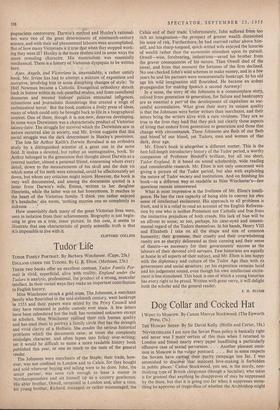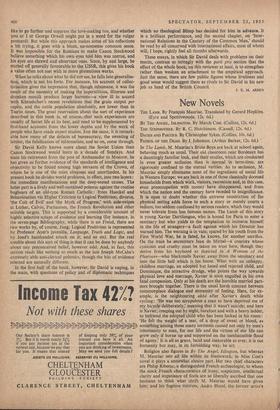Dog Collar and Cocked Hat
I WENT TO Moscow. By Canon Mervyn Stockwood. (The Epworth Press, 15s.) THE HUNGRY SHEEP. By Sir David Kelly. (Hollis and Carter, 18s.) 'NEVERTHELESS I am sure the Soviet Press policy is basically right and never was I more certain of this than when I returned to London and found nearly every paper headlining a particularly offensive case of sexual perversion. . . . Another pleasant omis- sion in Moscow is the vulgar postcard. . . . But in- some respects the Soviets have carrild their purity campaign too far. I was astonished to discover that innocent love-making is forbidden in public places.' Canon Stockwood, you see, is the sturdy, non- thinking type of British clergyman (though a Socialist), who takes it for granted that anything he disapproves of may be suppressed by the State, but that it is going too far when it suppresses some- thing he approves of (regardless of whether the Archbishop might
like to go further and suppress the love-making too, and whether you or I or George Orwell might put in a word for the vulgar postcard). But while this approach makes some of his reflections a bit trying, it goes with a blunt, no-nonsense common sense. It was impossible for the Russians to make Canon Stockwood believe something which his own eyes told him was untrue, and his eyes are shrewd and observant ones. Since, by and large, he started off generally favourable to the USSR, this gives his book a value often not met with in more pretentious works.
When he talks about what he did not see, he falls into generalisa- tion, which is not his forte. For instance, his account of collec- tivisation gives the impression that, though inhumane, it was the result of the necessity of making the superstitious, illiterate and drunken moujik produce larger harvests—a view ill in accord with Khrushchev's recent revelations that the grain output per capita, and the cattle population absolutely, are lower than in Tsarist times. The great reservation about the sort of experience described in this book is, of course, that such experiences are usually of Soviet life at its best, and need to be supplemented by first-hand accounts from the lower depths and by the work of people who have made expert studies. Just the same, it is remark- able how many of the defects of bureaucracy, the sweating of labour, the falsification of information, and so on, come through.
Sir David Kelly knows more about the Soviet Union than Canon Stockwood would learn in a decade of Sundays. And since his retirement from the post of Ambassador to Moscow, he has given us further evidence of the standards of intelligence and objectivity to be found among high servants of the Crown, of whom he is one of the most eloquent and unorthodox. In his present book he divides world problems, in effect, into two layers: the immediate manifestations and the deep-seated causes. The latter part is a lively and well-sustained polemic against the routine bugbears of an old-type Roman Catholic : from Haeckel and Behaviourism via Higher Criticism to Logical Positivism, divorce, `the Cult of Evil' and 'the Myth of Progress,' with side-swipes at Luther, Calvin, Puritanism, the French Revolution and other suitable targets. This is supported by a considerable amount of highly selective scraps of evidence and learning (for instance, in the seven-page Bibliography, while there is no Freud, there are two works by, of course, Jung; Logical Positivism is represented by Professor Ayer's juvenilia, Language, Truth and Logic, and by Joad's hamhanded attack on it; and so on). But the real trouble about this sort of thing is that it can be done by anybody about any preconceived belief, however odd. And, in fact, this section reads like nothing so much as the late Joseph McCabe's extremely able anti-clerical polemics, though the bits of evidence selected are naturally different.
In the first half of the book, however, Sir David is coping, in the main, with questions of policy and of diplomatic techniques which no theological Blimp has decided for him in advance. It is a brilliant performance, and the second chapter, on 'Inter- national Relations in the Century of the Common Man,' should be read by all concerned with international affairs, most of whom will, I hope, rightly feel all thumbs afterwards.
These essays, in which Sir David deals with problems on their merits, contrast so strongly with the parti pris section that the effect of the whole book, on this reviewer at least, is to strengthen rather than weaken an attachment to the empirical approach. Just the same, there are few public figures whose liveliness and good sense would suggest them as rivals to Sir David in his new

































 Previous page
Previous page